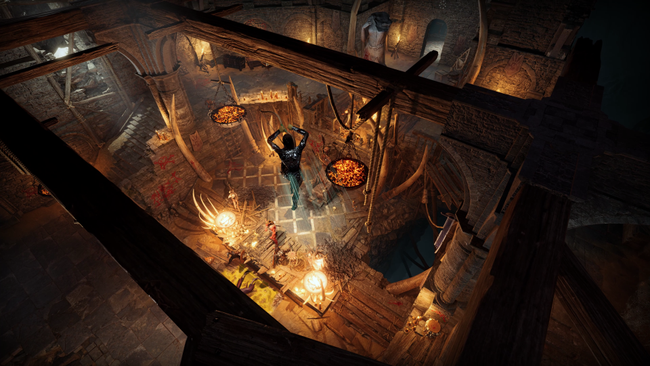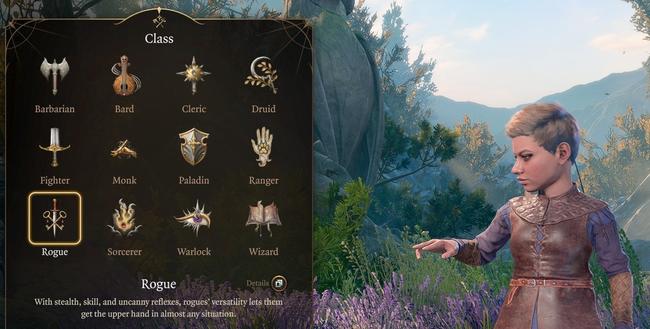
Baldur's Gate 3 Rogue Class Guide - Sneak attacks, Assassin and other subclass builds, and Feats
Whether it's a blade in the dark or a pick in the lock that's called for, a Rogue is who you'll call on in Baldur's Gate 3. One of the game's ultimate utility character classes, the Rogue can slip into enemy formations and fortresses alike unnoticed, ready to lead the way and position themselves to best take advantage of the coming chaos. If that's an appealing path for you, read on for the rest of our full Rogue class guide. For other classes and aspects of the game, see our full slate of available Baldur's Gate 3 guides.

Before You Begin
Note that none of these points are set in stone. Build your character the way you choose, and see these notes more as suggestions than rules. For more tips, check out our Baldur's Gate 3 Character Creation guide.
This guide will also assume that you are building a custom character. Origin Characters have unique interactions and roleplaying options available thanks to their preset nature. Astarion is a playable Rogue Origin character . Choose him as your Baldur's Gate 3 protagonist to play as a Rogue and experience his unique storyline.
Additionally, this guide presumes you are building a single-class character. Multiclassing into different classes as you level up is an option to gain new and useful abilities, but there’s also value in specialization. We’ll have a few multiclass suggestions for you at the end of the guide.
The Rogue Playstyle
The Rogue uses Dexterity as a main combat statistic, which means that they'll naturally favor using ranged weapons and melee weapons with the Finesse tag, which allows them to use their Dexterity bonus for attack rolls. However, don't expect even the best-built Rogue to be able to stand up on the front lines alongside the Fighters and Barbarians, or even be able to stand up in the melee like a Ranger can. That's because their weapon and gear proficiencies leave them far "squishier" than any other martial class. The Rogue is best used in a fight, less as an outrider or skirmisher (the province of the Ranger) but as a true ambusher: Lying in wait for an opening and then using their superior mobility to take an advantageous position every time, delivering death before an enemy even know they're there.
In combat, Rogues can switch easily between melee and ranged specialties, provided they're using Finesse weapons for the Dexterity bonuses. Players can choose to snipe from the shadows and take down vulnerable foes, but also be able to pull a dagger and skewer a foe that gets too close.
Rogues are also the best or second-best characters to have in the party to handle tasks related to traps, locks, scouting, and general exploration. They can explore more safely than any almost any other class, and their skill proficiencies rival that of the Bard. Their versatility is amped up even further depending on your subclass choice, with subclasses like the Arcane Thief adding a bit of magical potency to the Rogue's already-considerable toolkit.

Rogue Class Features
- Key Abilities: Dexterity and Intelligence
- Rogues are the spirit of cunning, and so specialize in the abilities associated with agility and quick wit.
- A rogue with the right proficiencies can use weapons that demand strength for attack rolls, but the Rogue's Sneak Attack feature in melee requires the use of a Finesse weapon. Thus, a Rogue that expects to fight as a Rogue shouldn't bother too much with a high Strength score.
- Gear Proficiency: Simple Weapons, Hand Crossbows, Longswords, Shortswords, Rapiers, Light Armor
- Skill Proficiency: At creation, Rogues can choose 4 skills for their proficiency. Sleight of Hand, Stealth, and Perception are bread-and-butter skills for Rogues, with Acrobatics favored by their naturally high Dexterity.
- Athletics
- Acrobatics
- Deception
- Insight
- Investigation
- Perception
- Performance
- Persuasion
- Slight of Hand
- Stealth
- Sneak Attack: The reason a Rogue can clean up in combat, Sneak Attack works with ranged weapons and with Finesse-tagged Melee weapons. Once per turn, you can attack a distracted target and do extra damage that increases with your levels. By "distracted", this means that you have Advantage, or if an enemy of your target is within 1.5m and you don't have Disadvantage.
- Cunning Action: Cunning actions are special actions Rogues can take as bonus actions that emphasize their skills and concealment. Cunning actions cover hiding, dashing, and disengaging, and are more likely to succeed when favored by Dexterity and skill bonuses.
- Uncanny Dodge: Take half damage when an attack hits you. This Rogue feature helps alleviate the class' low HP.
- Expertise: Like the Bard version of the same feature, Expertise effectively doubles your bonus for two skills of your choice.
- Evasion: A form of uncanny dodge for magic, this feature enhances reflex saving throws against spells. Against a spell that requires a reflex saving throw, a failed save only deals half damage, while a succesful one deals no damage.
- Reliable Talent: Roll a minimum of 10 on ability checks for skills you have proficiency in.
Rogue Gear Recommendations
- Rogues have a fairly limited default gear selection, with only simple weapons, light armor, and a few specific weapons. Overall Rogues should favor using ranged weapons like shortbows and light crossbows, as well as Finesse weapons like rapiers, daggers, and shortswords. These all benefit from the Rogue's dexterity bonus. Using a longsword or other strength weapon is possible, but these weapons won't trigger sneak attack bonuses.
- Similarly, light armor gains benefits from dexterity to armor class, but medium armors limit this bonus to +2 in most cases. Though a rogue can acquire medium or even heavy armor proficiency through feats and multiclassing, it's not really worth it to try from an optimization perspective, thanks to their penalties to stealth.

Rogue Subclasses
The Rogue's famous versatility is further augmented when the time comes to choose a subclass at level 3. From there, Rogues can choose to be even better at what Rogues do best, by choosing the way of the Thief, they can open a new bag of magical techniques by becoming an Arcane Trickster, or become a killing machine that operates in the shadows: An Assassin.
Thief
As evidenced by the name of the subclass, Thieves excel at the Rogue's "traditional" role, playing the part of a supreme cat burglar that can break through any security undetected. In and out before anyone even knows they were there, a Thief doesn't fear working alone, and can take even more bonus actions in combat.
Subclass Features
- Fast Hands: A simple but powerful benefit, Fast Hands grants the rogue additional bonus actions. These actions can be used to deliver more attacks, use tools, throw weapons, or do any number of things. This can be deadly in the (fast) hands of a Rogue with Two-Weapon Fighting, as you can use your off-hand attacks to deliver multiple sneak attacks per turn, killing enemies far faster than the damage rating on a light weapon might suggest.
- Second Story Work: A situational benefit, this feature makes Rogues resistant to falling damage. This also applies to damage taken when jumping from high places, opening up further possibilities for taking advantage of the Rogue's mobility.
- Supreme Sneak: A rogue's sneaking affinity becomes so potent that Thieves can make themselves invisible outright.
Arcane Trickster
The Arcane Trickster is the Rogue with a bit of magic to spice up their life. Arcane Tricksters can be surprisingly potent combat casters, since Rogue Ability Score synergies line up to favor nice bonuses in Dexterity, the class' combat ability, and Intelligence, the Arcane Trickster's spellcasting ability. In other words, the same abilities you pump to improve your skill bonuses are often the same ones that improve your performance as an Arcane Trickster. The downside is that Arcane Trickster spells are just that - tricks. They don't gain access past 2nd Level Wizard spells, and as such won't hit the full height of magical potential a dedicated caster can manage.
Subclass Features
- Arcane Spellcasting: Arcane Tricksters gain access to Cantrips and 1st- and 2nd-level wizard spells, casting them with Intelligence as a main statistic. An Arcane Trickster will likely still rely on their weapons for most of their level progression, but the range of spells available can significantly improve their versatility.
- Mage Hand Legerdemain: Arcane Tricksters have access to an exclusive, enhanced version of the Mage Hand cantrip. This version is invisible and carry out more tasks than the standard Mage Hand. That means doing things like pulling switches, manipulating objects, and even stealing from a distance.
- Magical Ambush: While you're hidden, your targets have disadvantage on saves against your spells. While an Arcane Trickster can't sneak attack with a spell (sad!), they can cast spells in a way that makes them hard to resist, which can make a significant difference for spells like Sleep, Friends, or Charm Person.
Assassin
The Rogue Assassin brings the "OTK" concept from card battlers to the battlefields of Baldur's Gate 3, with a kit full of skills designed to deliver swift and certain death to targets, killing them before they even know they're dead. Assassins gain a small but potent set of bonuses designed to increase the viciousness of the Rogue's signature Sneak Attack, ensuring that Assassins get the first move...and that the first move is the last.
One note: Assassins benefit so much from opening combat while remaining hidden, there's a natural incentive to favor ranged weapons to do this grim business with. Getting up to melee range entails a fair amount of risk compared to finding a good sniping position. Consider your movement options and stealth capabilities carefully when building out your Assassin.
Subclass Features
- Assassinate: Assassins get this multi-layered enhancement to their combat capabilities the second they choose the subclass. Essentially, it does the following:
- Grants Advantage on attack rolls against targets that haven't taken a turn yet.
- Guarantees Critical Hits on successful attack rolls against targets affected by Surprised. Surprised is a status effect that happens when you engage a target before it notices you. Surprised targets can't move, take actions, or perform reactions during the first turn of combat.
- Assassin's Alacrity: Restores your action and bonus action at the opening of combat. This means that if you open combat with a sneak attack on an unaware enemy, you immediately get your actions back when combat begins "properly".
- Infiltration Expertise: A highly effective disguise action, Infiltration Expertise semi-permanently allows Assassins to adopt a new identity until their next long rest. This lets them play up the "Agent 47" doctrine of walking around restricted areas and enemy strongholds disguised as one of the enemy's own, until the right time to strike presents itself.

Rogue Level Progression
These are the class features you’ll get as you level up as a Rogue. The maximum level cap in Baldur’s Gate 3 at launch is Level 12. Use this to see what you’ll get at each level and plan accordingly, in case you wish to multiclass.
This guide will also highlight class features you gain based on your subclass choice. For more detailed info about the subclasses, see the sections above. Features gained by a Subclass are labeled with the Subclass name.
Note: Unlabeled benefits are “standard” class features and common to all subclasses.
Level 1
- HP: 8 HP + Constitution Modifier, gaining minimum of 5 HP + Con modifier per level.
- Sneak Attack
- Gear Proficiency: Simple Weapons, Hand Crossbows, Rapier, Shortsword, Longsword
- Skill Proficiencies: 4 skills
- Expertise: Add expertise to 2 proficient skills
Level 2
- Cunning Action: Hide, Dash, Disengage
Level 3
- Rogue Subclass: Choose 1 from Thief, Assassin, Arcane Trickster
- Thief: Fast Hands, Second-Story Work
- Arcane Trickster: Spellcasting, Mage Hand Legerdemain
- Assassin: Assassinate, Assassin's Alacrity
- Arcane Trickster Spells: 3 cantrips, 2 Level 1 spell slots
Level 4
- Feat Selection: Can pick a Feat from All Classes Feat list. While any class at level 4 can pick many of the Feats, not all will be relevant to the class. You can also choose an ability improvement to boost a bonus or eliminate a penalty. Check out our full Feats guide for more advice on Rogue-appropriate Feats.
- Recommended Rogue Feats:
- Ability Improvement
- Athlete
- Defensive Duelist
- Dual Wielder
- Dungeon Delver
- Lucky
- Mobile
- Sharpshooter
- Tough
- Weapon Master
- Recommended Rogue Feats:
- Arcane Trickster Spells: +1 Level 1 spell slots (3 total)
Level 5
- Uncanny Dodge
Level 6
- Expertise: Add expertise to 2 skills
Level 7
- Evasion
- Arcane Trickster Spells:
- +1 Level 1 spell slots (4 total)
- 2 level 2 spell slots
Level 8
- Feat Selection: Can pick a Feat from All Classes Feat list
Level 9
- Thief: Supreme Sneak
- Arcane Trickster: Magical Ambush
- Assassin: Infiltration Expertise
Level 10
- Feat Selection: Can pick a Feat from All Classes Feat list
Level 11
- Reliable Talent
Level 12
- Feat Selection: Can pick a Feat from All Classes Feat list

Multiclass Rogues
Rogues are popular classes to dip into for their extra skills and access to sneak attack, but they can be easy to multiclass out of as well, in part because some of their best class and subclas features show up early in the progression.
That said, Rogues with a mind to single-class or to only dip into one or two other classes can benefit. They gain access to a 4th feat selection at level 10, and some powerful subclass features land on top of their already formidable toolkit.
Rangers are pretty good multiclass options for Rogues that like a bit of stand-up fighting, or who want to become even more deadly. The combination of Assassin and Gloom Stalker subclasses in a dual-class Rogue/Ranger (or Ranger/Rogue) build with a focus on Dexterity and Finesse weapons can deal terrifying first-turn damage and have unequaled mobility in stealth.
Bards are also good picks for Rogues that really want to boost their overall utility. With a high Charisma bonus, a Rogue/Bard can be a true do-anything class, able to make a scene as a performer or a party "face" and skulk in the shadows like a proper sneak-thief. Watch out, though: The Arcane Trickster uses Intelligence as their spellcasting ability, while the Bard's spells are powered by Charisma. You may have difficulty allocating your ability scores and bonuses if you blend those two subclasses.
Fighters can be a choice for Rogues that want to benefit from Action Surge or the addition of a Fighting Style, but be warned: Most medium armor carries stealth and dexterity bonus penalties, and you can't sneak attack without a Finesse Weapon. Rogues can use some of the maneuvers known by the Battle Master subclass effectively, becoming a tactical nexus as well as a utility character.
Many Rogues will have Intelligence as their second highest Ability Bonus, so levels spent on classing as a Wizard won't go wasted. With the right amount of Wizard levels, a Rogue can gain more spells than an Arcane Trickster, at the cost of losing some Rogue features like a 4th Feat.